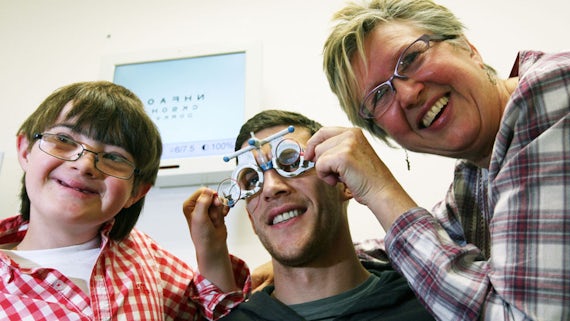Down’s Syndrome Vision Research Unit
Cardiff University's Down's Syndrome Vision Research Unit is a global centre of excellence into the research and treatment of vision problems in children with Down's syndrome.
It was awarded one of the Queen's Anniversary Prizes for Higher and Further Education in 2017.
Children with Down's syndrome are at much greater risk of eye and vision disorders than typically developing children, need regular eye examinations, and are more likely to need glasses and compensation in the classroom for visual deficits.
Before the establishment of the Down's syndrome Vision Research Unit, these specific visual problems were very poorly understood, misinterpreted and undiagnosed. As a result, the Unit was established, in direct response to this neglected area of research and is now at the forefront of research in its field.

With the support of a large and enthusiastic group of families, our research unit has been given the opportunity to increase understanding of the visual development of children with Down's syndrome, change how their vision problems are perceived and treated, and subsequently revolutionise their eye care practice across the UK and abroad.
The Unit's life-changing research discoveries, such as the process which corrects errors in typical infants fails in those with Down's syndrome, and the benefit of bifocals for their conditions, have directly underpinned national and international guidance on their vision care. The research has also informed training for optometrists and changed the way that those working with and educating young people with Down's syndrome set up the learning environment.
Changes to sight tests, teaching methods and resources for children with Down's syndrome are just some of the life-changing impacts of the Unit's work.
Since 1992, the Unit has built the world's only longitudinal cohort of young people with Down's syndrome. Currently over 250 children and young adults from all over the UK take part in its studies, ranging from 1-25 years old. Each individual's visual and general development has been monitored by the Unit over time, making this group and its data unique: it is the largest database of its kind in the world.
The Unit is also the only optometry teaching centre in the UK that directly includes a dedicated course in special needs optometry as part of the undergraduate curriculum.
Over the coming years, members of the Unit plan to turn their attention to implementing a special school eye care service in Wales, by providing training for the optometrists involved. They also aim - through collaborations with partners - to establish a similar service in the other three nations in the UK.
The Unit currently consists of nine members of staff and one post-graduate research student. It has 11 past members and an ability to attract high-quality visiting researchers to the University.
Awards and recognition
The impact and advances of the Unit's work have been recognised with major awards, as well as smaller community accolades, which are testament to the real, lasting links this Unit has made. Members of the Unit have also been elected to positions of prominence that reflect positively on the institution's research activity.
Examples include:
- Students Improving Patient Safety and Quality, NHS Wales Awards 2016.
- Lifetime Achievement Award, Association of Optical Practitioners 2015.
- OBE to the Unit's director, for services to Optometry and people with disabilities in 2014.
- Special Assessment Clinic - award for Clinical Excellence, Autism Professionals Awards 2013.
- Honourable mention in the category Lifetime Achievement Award in the Understanding Disability Awards 2012.
- Member and advisor to the Down's Syndrome Medical Interest Group (DSMIG) - the first non-medic to be invited to join.
We are working with a large and enthusiastic group of families to understand more about visual and general development of children with Down's syndrome. Our research has changed eye care practice across the UK and abroad.
